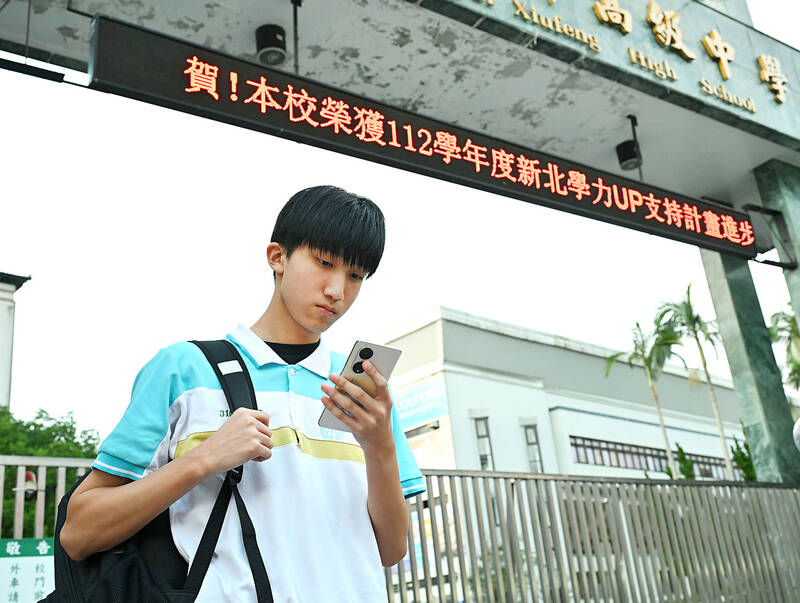The Ministry of Education (MOE) yesterday announced new draft guidelines for cellphone use in schools below college level, with stricter regulations for lower grades and flexibility for schools or classes to set their own rules.
A “centralized management” approach would be adopted for elementary and junior-high schools under the Guidelines for Management of Mobile Device Use in School Campuses Below Senior High Level (高級中等以下學校學生攜帶行動載具到校管理原則).
Schools or individual classes would manage rules, but with details subject to approval by school boards.

Photo: Tien Yu-hua, Taipei Times
As students are minors, parents and guardians would still bear legal responsibility for their behavior and safety, the guidelines say, adding that students would need permission from a legal guardian to bring a mobile phone or similar device on campus.
High schools would have more flexibility, allowing students, parents and teachers to jointly decide on management methods, including when phones can be used on campus.
High-school students have “self-management abilities” and may bring devices on campus in accordance with school regulations, although schools are encouraged to inform parents of the rules, the ministry said.
The student group EdYouth said in a statement that device usage should only be controlled during class time to avoid overregulation.
The ministry said that devices must be turned off or switched to airplane mode and stored away during class hours, except when used for educational purposes or emergency situations.
Although technology can be used to accelerate learning, there must be a balance to avoid overreliance on personal devices, the harmful effects of social media and addiction, it added.
In other education news, MOE officials said they would consider shifting three days around on the academic calender next year, after receiving feedback from parents.
Parents’ groups have said that a new semester calendar for elementary schools up to high schools showed that the winter break would be between Jan. 21 and Feb. 10 next year, with school beginning on Feb. 11.
However, three days later, the students would be off for the weekend, followed by Lunar New Year’s Eve on Monday, Feb. 16, and then the Lunar New Year holiday until Feb. 19.
Parents said they wanted to eliminate the three intervening days, Feb. 11 to 13, to have consecutive days off, making it easier to plan holiday trips.
Ministry officials said they would collect feedback to make the adjustment, with one option being to shift the three intervening days, to hold classes on Jan. 21 to 23, at the start of winter break.
The summer break for students would be 60 days, from July 1 to Aug. 28, it said.
Additional reporting by Rachel Lin

Taiwan is projected to lose a working-age population of about 6.67 million people in two waves of retirement in the coming years, as the nation confronts accelerating demographic decline and a shortage of younger workers to take their place, the Ministry of the Interior said. Taiwan experienced its largest baby boom between 1958 and 1966, when the population grew by 3.78 million, followed by a second surge of 2.89 million between 1976 and 1982, ministry data showed. In 2023, the first of those baby boom generations — those born in the late 1950s and early 1960s — began to enter retirement, triggering

One of two tropical depressions that formed off Taiwan yesterday morning could turn into a moderate typhoon by the weekend, the Central Weather Administration (CWA) said yesterday. Tropical Depression No. 21 formed at 8am about 1,850km off the southeast coast, CWA forecaster Lee Meng-hsuan (李孟軒) said. The weather system is expected to move northwest as it builds momentum, possibly intensifying this weekend into a typhoon, which would be called Mitag, Lee said. The radius of the storm is expected to reach almost 200km, she said. It is forecast to approach the southeast of Taiwan on Monday next week and pass through the Bashi Channel

NO CHANGE: The TRA makes clear that the US does not consider the status of Taiwan to have been determined by WWII-era documents, a former AIT deputy director said The American Institute in Taiwan’s (AIT) comments that World War-II era documents do not determine Taiwan’s political status accurately conveyed the US’ stance, the US Department of State said. An AIT spokesperson on Saturday said that a Chinese official mischaracterized World War II-era documents as stating that Taiwan was ceded to the China. The remarks from the US’ de facto embassy in Taiwan drew criticism from the Ma Ying-jeou Foundation, whose director said the comments put Taiwan in danger. The Chinese-language United Daily News yesterday reported that a US State Department spokesperson confirmed the AIT’s position. They added that the US would continue to

The number of Chinese spouses applying for dependent residency as well as long-term residency in Taiwan has decreased, the Mainland Affairs Council said yesterday, adding that the reduction of Chinese spouses staying or living in Taiwan is only one facet reflecting the general decrease in the number of people willing to get married in Taiwan. The number of Chinese spouses applying for dependent residency last year was 7,123, down by 2,931, or 29.15 percent, from the previous year. The same census showed that the number of Chinese spouses applying for long-term residency and receiving approval last year stood at 2,973, down 1,520,